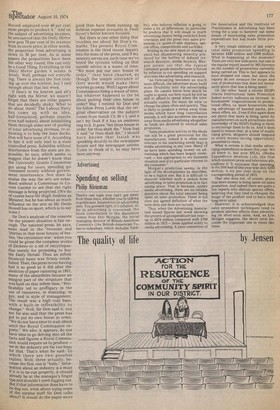Spending on selling
Philip Kleinman
There's one topic you can't get away from these days, whether you're talking to politicians, housewives or advertising men. You guessed right, it's inflation. As far as advertising is concerned, the latest contribution to the discussion comes from Eric Morgan, the jovial managing director of British-American Cosmetics (the British-American Tobacco subsidiary which includes Yard ley), who believes inflation is going to make a lot of differences. In particular he predicts that it will result in much advertising money being switched from television and the press into sales promotion, i.e. point-of-sale displays, special offers, competitions and suchlike.
Writing in the new issue of Admap, a small but illuminating monthly produced for the boffins of Adland (research directors, media buyers). Morgan points out that the typical consumer goods manufacturer is forced by inflation to cut spending on support activities like advertising and research.
"As forecasting becomes so much more difficult, the advertiser must build more flexibility into his advertising plans. He cannot know how much he ought to spend, nor how much he will be able to afford to spend when the time actually comes. He must be able to change his plans often and quickly. This is likely to produce a swing away from media which have long cancellation periods; it will also accelerate the move away from media advertising altogether as funds are diverted to tactical sales promotion.... "Sales promotion activity in the shops can still be a great protection for the manufacturer; indeed it is often more relevant to his marketing needs than is media advertising in any case. Many of us have been spending money on advertising which has been largely irrelevant — not appropriate to our business situation and of no particular interest to the consumer."
Morgan's prediction seems, in the light of the developments he describes, to be a logical one. But it is difficult to discover whether such a switch from advertising to sales promotion is in fact taking place. That is because, unlike media advertising, there are no reliable statistics about the total amount being spent on sales promotion. There is not even any agreed definition of what the term does and does not include.
Thus, when the Advertising Association issued figures last week showing the growth of ad expenditure last year — up to £874 million compared with £708 million in 1972 — these applied solely to media advertising. A joint committee of the Association and the Institute of Practitioners in Advertising has been trying for a year to hammer out some means of monitoring sales promotion expenditure but has made little progress.
A very rough estimate of last year's total sales promotion spending is between E450 million and £500 million. What is happening at the moment? There are very few indicators, but one is the regular report issued by MS Surveys on the number of promotions currently being carried on. This in fact appears to have dropped not risen, but since the reports do not measure the scope and cost of promotions that does not necessarily prove that less is being spent.
On the other hand a recent HISPI (Harris Iriternational Sales Promotion Index) survey indicates an increase in housewives' responsiveness to promotional offers, i.e. more housewives taking advantage of banded packs, premium offers, etc. Even if this again does not prove that more is being spent by manufacturers on such attractions mere knowledge of the HISPI finding is likely to encourage them to do so. And it does stand to reason that, at a time of madly rising prices, shoppers should respond to every money-saving opportunity presented to them.
What is certain is that media advertising expenditure is down this year. We all knew it, but now MEAL (Media Expenditure Analysis Ltd), the firm which monitors press and television ads, confirms it. It estimates that spending in the first half of this year was only £203 million, a six per cent drop on the corresponding period of 1972.
That also does not, of course, prove that more money is being spent on sales promotion. And indeed there are quite a few experts who distrust special offers, believing that they tend to cheapen the image of the product and to have little long-term value.
However, it is acknowledged that sales promotion techniques tend to produce quicker effects than advertising on short-term sales. And, as Eric Morgan suggests, the short term becomes the important one in times like these.
































 Previous page
Previous page